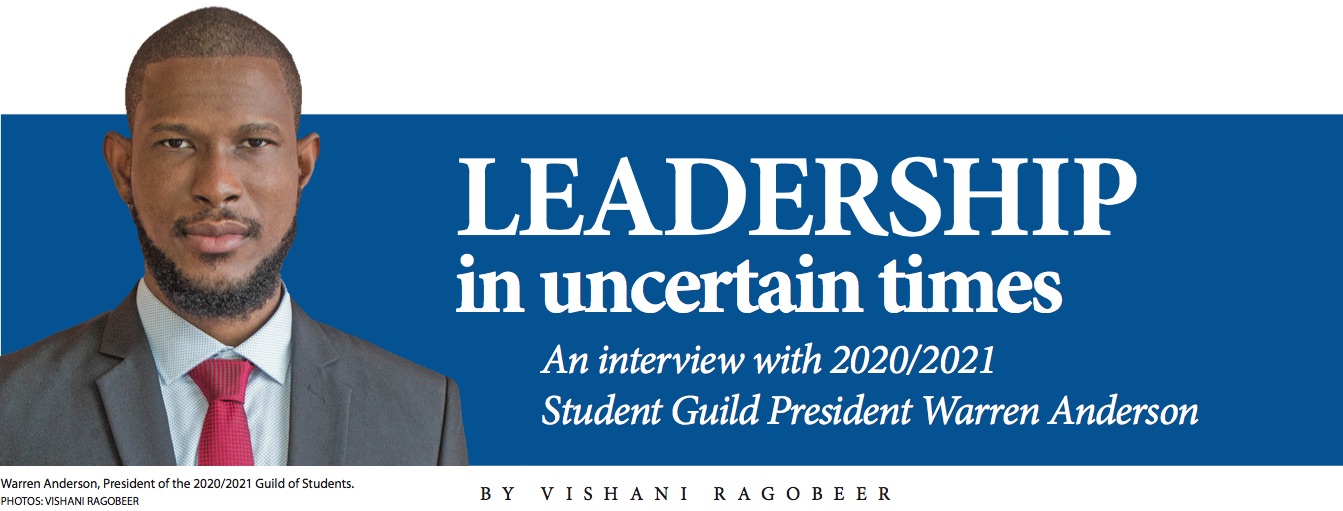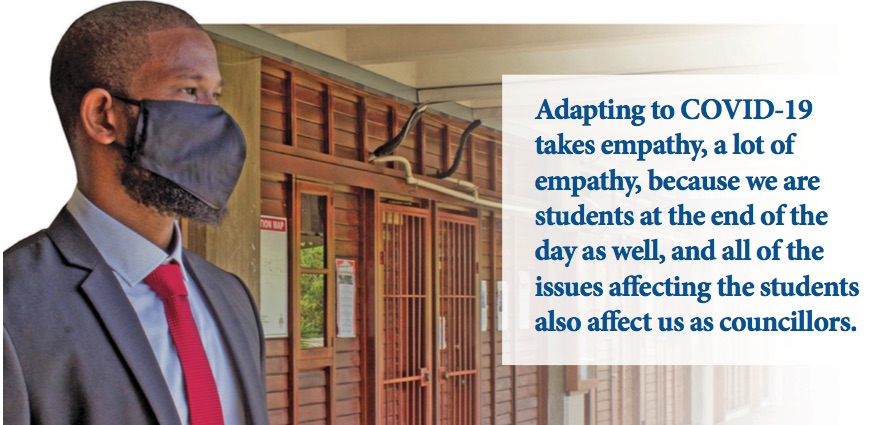
Warren Anderson, the 2019/2020 Evening and Part-time Representative on the Guild of Students Council clinched a mere eight votes more than his closest competitor at The UWI’s Guild Elections in March. These eight votes won the 35-year- old Management student the presidency for the Council for the 2020/2021 academic year.
Months after that election, after he was sworn into the position on June 1, Warren visited the Student Activity Centre or “SAC” as it is more commonly called. This area usually buzzes with activity. It is a cacophony of chatter, a collage of social interactions, rounds of All Fours and students with their heads buried in lecture slides. But when Warren took a stroll through, he had to dust off the bench before sitting. SAC was empty.
This is the reality with which he has to contend – at least for the first few months of his tenure as Guild President. Student life on the St Augustine campus will not be the same; meetings and engagements with students may change into Zoom sessions and email threads.
UWI TODAY interviewed Warren to hear about his plans for the year ahead.
UT: Why did you decide to run for President of The UWI’s Guild of Students?
WA: I never had any ambitions of doing so as a UWI student. I was really urged by the prompts of other students. People put trust in me based on my performance as Evening and Part-time Representative because I tended to dig deep into the constitution to find inefficiencies in the way the Guild was operating. Wherever I am, as long as I see improvements can be made, changes can be made, I offer a hand. It just so happened to be in this form at this time.
UT: How do you intend to improve the operations of the Guild, then?
WA: It’s a simple matter of materialising two buzzwords that people often say but the output surrounding them we don’t often see – accountability and transparency. The way we intend to do that is by publicising our strategic plan at the beginning of the semester, which will be accompanied by a calendar. So just like how we advertise the social aspects – Guild Fest and the parties – we are bringing relevance to these things, and from the earliest, we are saying to the student population “these are the things that are important and we are going to work towards them”.
UT: What does this strategic plan entail?
WA: Councillors have already been engaged with this strategic plan and we’re working to release the plan at the start of the new semester for the consumption of all the students so that they are aware of the functions of the Guild. This would lead to more buy-in from the students, which should empower them to hold us accountable and necessitate us holding ourselves accountable. The proper running of the Student Senate, which is mandated by the constitution, is another thing. We are going to impress upon the students the importance of the Student Senate and that will be a major leap in terms of disciplining and ensuring the functioning of the Council. Consistent training of the guild councillors is another aspect. As leaders, we ought to strengthen our own administration and we must expose and repair our inefficiencies to improve our delivery of services.

UT: How do you also intend on navigating the COVID-19 pandemic and its ramifications?
WA: Adapting to COVID-19 takes empathy, a lot of empathy, because we are students at the end of the day as well, and all of the issues affecting the students also affect us as councillors. Organisations have reached out and offered assistance and we have been able to streamline this through the Guild’s National Affairs Committee. We will continue working with The UWI’s administration to aid students in their personal situations.
For students outside of Trinidad and Tobago, we intend to add our voice to the conversation with governments, through The UWI administration, to accommodate those students’ return to [the campus]. There will be a cost factor to consider, but we are prepared for those conversations. Also, we are prepared to act on behalf of students and advocate for just fees that match the experience. And in our advocacy, we would expect the campus to respond with justifications for those fees. In the worst-case scenario, we don’t want students to be put in a position to take leaves of absence.UT: Finally, what do you think makes you the person for the job?
WA: I grew up in a community where when the going gets tough, we become creative and we get it done, so I am not fazed by difficulties. I have lived through the challenges that many students are facing themselves, and I can appreciate the serenity of an exam room as compared to being at home, bargaining for space. Being adaptable augurs well for me but I need to be able to lend that power to my team, and I believe I can do that.